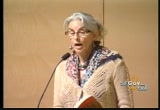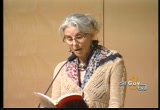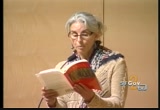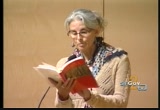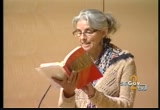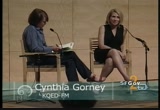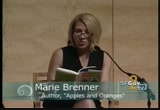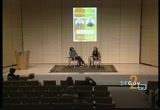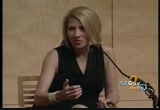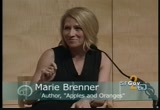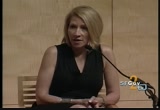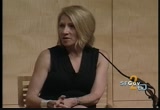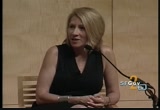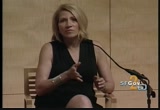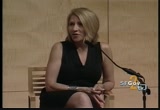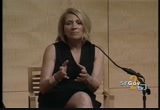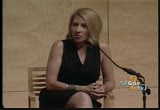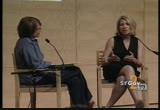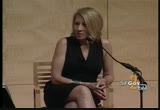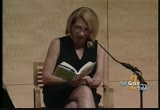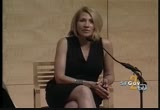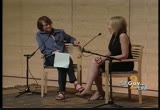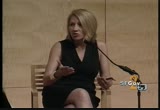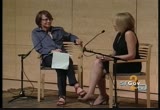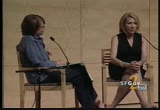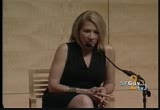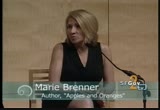tv [untitled] September 28, 2012 7:30am-8:00am PDT
7:30 am
her adolescence. it travels through her journey as a queen and a goddess, and much of her story is devoted to the love, a very passionate love, for dimusi, who is a shepherd who she takes as her husband, lover and king. and this is called the return. a lament was raised in the city. my lady weeps bitterly for her young husband. anana weeps bitterly for her young husband. woe for her husband, woe for her young love, woe for her house, woe for her city. dimusi was taken captive in aruk. he will no longer bathe in aradu. he will no longer treat the
7:31 am
mother of anana of his mother. he will no longer perform his sweet task among the maidens of the city. he will no longer raise his sword higher than the kugar of priests. great is the grief of those who mourn for dimusi. anani wept for dimusi. gone is my husband, my sweet husband. gone is my sweet love. my beloved has been taken from the city. oh, you flies of the steppe, my beloved bride groom has been taken from me before i could wrap him with a proper shroud. the wild bull lives no more. his shepherd, the wild bull, lives no more. dimusi, the wild bull, lives no more. i ask the hills and valleys where is my husband. i say to him, i can no longer
7:32 am
bring him food. i can no longer serve him drink. the jackel lies in his bed. you ask me about his reed pipe. the wind must play it for him. you ask me about his sweet songs. the wind must sing them for him. satur, the mother of dimusi, weeps for his song. once my boy wandered so freelly on the steppe, now he is captured. once dimusi wandered so freely on the steppe, now he is bound. the ewe gives up her lamb, the goat gives up her kid. my heart plays the reed pipe of mourning. in a place where he once said my mother will ask for me, now he cannot move his hands, now
7:33 am
he cannot move his feet. i would see my child. the mother walked to the desolate place. she looked at the slain wild bull. she looked into its face. she said, my child, the face is yours. the spirit has fled. there is mourning in the house. there is grief in the inner chambers. the sister wandered about the city, weeping for her brother. gestanana wandered about the city, weeping for dimusi. oh, my brother, who is your sister? i am your sister. oh, dimusi, who is your mother? i am your mother. the day that dawns for you will also dawn for me. the day that you will see, i will also see. i would find my brother, i would comfort him, i would
7:34 am
share his fate. when she saw the sister's grief, when anana saw the grief of gestana, she spoke to him gently. dimusi is no more. i would take you to him, but i do not know the place. then a fly appeared. the holy fly circled the air above anana's head and spoke, if i tell you where dimusi is, what are you give me? anana said, if you tell me, i will let you frequent the beer houses and taverns. i will let you dwell among the talk of the wise ones. i will let you dwell among the songs of the minstrals. the fly spoke. lift your eyes to the edges of the steppe.
7:35 am
lift your eyes to arali. there you will find gestanana's brother. there you will find the shepherd, dimusi. anana and gestanana went to the steppe. they found dimusi weeping. anana took his and and said, you will go to the underworld for half of the year. your sister, since she asked, will go the other half. on the day gestanana is called, that day you will be set free. anana set dimusi's hand in the and of the holy, great is your renoun, holy aristagal. i sing your praises.
7:37 am
>> welcome to town. it is nice to have you here. >> good to be here. i want to start right in about this book, um by having you read us, this letter that your brother wrote to you when he was at the university of pennsylvania and you were the younger sister that starts right down there. remind us roughly what the year was. >> the year was 1965. the moral of this story is never have a younger sister who never throws away a piece of paper. i discovered this letter 4 or 5
7:38 am
months before i finished this book oh my god, a paper trail sets us straight. >> read it to us. >> only people from brooklyn uses the word geez. your letter doesn't have a single worthwhile sentence in it. i will not buy you any notebooks. i repeat no notebooks. but i will send you decals that are not to be placed in my room, around my room or on the window of my car. >> okay. who was this guy? and why did you set out to tell this story? >> this guy was my fantastic, magnet, bossy, difficult, older brother carl. he was the red state to my blue
7:39 am
state. all you have to understand to know about how complicated and difficult this relationship was my first memory of my brother was with when he sail me out a window when i was 2 years old and in the san antonio emergency room with a cut on my eye brow. he gave me the gift of a hard head. he went from there to being the youngest member of the john berk society and coming into my room to smash my joan biaz records because she was on the list. he was complicated, but saying all of that he was mysterious. he grew up to be a trial lawyer
7:40 am
turned apple orchardist. part of the madening sibling thing was understanding the control freak nature that my brother had. for example, every year he would send me a box of fruit. the fruit he grew in his gorgeous orchards in washington state. the fruit came with the carl tax where you would get 25 telephone calls before the fruit came, such as, fruit is coming next week, are you going to be home? this is said in a texas accent. i would say i don't know. he said you have to be there because they are my pears and precious and have to put them in the refrigerator the minute you come in. i learned to say okay. then the fruit would come and it would be wrapped like a bomb
7:41 am
or something, each fruit, each pear. these gorgeous asian pears had sty row foam socks wrapped around them. after the fruit came you'd get a series of phone calls, can i demand a refund from the ups man, are you sure, can you write down what time it came? >> you have been carrying around this story all your life, what happened, why turn it into a book? >> it was a huge decision. it came completely. so many of us carry around this sibling thing in the attic thing. it came to me because something
7:42 am
happened in our life which transformed our relationship. it was huge for me and huge for him. we learned how to become a team. and we had, my brother had a crisis and wrote me a letter about it, kind of a stunning letter that came like a time bomb, when he was quite young, barely 50 that he had a rare form of non smoker's lung cancer. it was all typed out like the fruit in a control freak way, a lawyers letter that came by fed excompletely mysterious when we had just been together at thanksgiving for 4 or 5 days. i get this manifesto, i am asking you to save my life. my life changed completely when that letter came into my life. then the great task was with
7:43 am
how to come together, which we did. again, it was a huge experience. i never thought i would write about it. i didn't think i could bring myself to. >> yet you took notes all the way through? >> of course. i write in a journal almost everyday. i was trying to come up with a new book idea. i wanted to write about this. the first day was to meet with sara to meet about books. we discovered that we both had an older brother thing that she had a brother who was as mysterious to her as mine was to me. it was so perfect, cynthia, we
7:44 am
had launched on our brothers. we stayed there for the next 3 hours, and closed the cafe. sara said this brother sister thing is huge and no one writes about it, no one talks about it, the affect our brothers and sisters has on us. this is your next book, this is what you need to write. are you kidding me, i could never write anything so personal, never. that is how it started. when you >> when you were working on this, friends, you would talk about my relationship with my difficult older brother, what happened? what doors opened up, what did you learn about what people carry around about their siblings? >> it is huge. so many share this. it is like the asian flu. the first year of trying to
7:45 am
work on this, i couldn't do it, so i approached it like a reporter. i was dancing around what it was really about, which is the red hot emotions between the 2 of us and where it had come from. i spent a year reporting, interviewing every expert, i flew the london, and the importance of relationships and psychoanalysis. >> did you learn anything? >> for example, by the age of 11, we are spending a third of our time with our brothers and sisters far more than we do with our parents, with our friends, and yet it has taken 80 years for psychiatry and family therapy to even say, maybe this is important. so by the time you get to be
7:46 am
adults, often you are strangers, you are foreigners. there is a national statistic about 45 to 50 percent of us have challenged relationships that you have, you know, borderline things, 10 percent of people don't speak to their siblings at all. twelve percent are what my brother and i were. you would brace yourself to be with your, i would brace myself, my brother would start his tirades and all of these
7:47 am
shadow issues. >> as you were hearing the stories of the people you would hear well, all of this academic and intellectual grounding for sibling relationships, then what happened? >> it was a trigger, people would say what are you working on? i would say the story about my brother and me. people would tell me about their stories. we are like minnows swimming in the well of childhood as brothers and sisters. one of the great questions for many of us is why can't we see our brother or sister as others see them?
7:48 am
there was carl brenner, fantastic apple guy, expert on opera, he was an alpha romantic figure, flew a plane, looked like harrison ford, many lady friends, wine lover connoisseur. why did i think of him as this difficult person and why did he see me as this is his perception, which of course, i am perfectly willing to say that is me, put the mirror up. miss know it all, expert, his perception was that little sister always trying to get attention. this is pathetic, we'd get together and fight over
7:49 am
everything. it was like we were back fighting in the backseat of the car. first time i went to the apple orchards, we had a huge fight about how to pick his fruit. i was bruising the apple. you are bruising my fruit. it was pathetic. you get stuck in that role playing because you are stamped with children with the roles. >> the character we see in this thing most of the time is pretty objectively difficult, not just somebody who is always irritated at his sister, but somebody mean, who has made his mother sad and angry and reaction to most things is sour and hostile. how much of that did you end up feeling was you and the lens
7:50 am
you were looking at and how much was carl? >> a great deal of it. the book is written as a drama between a brother and sister. it is a double family story of how skewed and blind our perceptions. it is written in dramatic themes. it takes place from the tormented younger sister's view. one of the most challenging aspects and excruciating painful for me writing apples and oranges and say what is my responsibility here? how can i put this on the page? how i drove my brother crazy. >> one of the things i want to
7:51 am
ask you about, your books, you are known as an investigative reporter, long complex narratives involving dramas and situations. i am curious to know what was hardest about memoir with somebody living their life as a working journalist? let me preface it a little bit with someone who has similar tendency. this is from 2005. i would like it if you would read from here. >> perfect. yeah. this is a moment in the book where, i am kind of flipping out writing about my brother. i am listening to tapes, because of course i have gone
7:52 am
back to the orchards, my brother has died at a young age. i have gone back to the orchards to do interviews, i keep doing this dancing about what it is really about. i am saying i am outside the event although in the middle of it. it is protection, part of the latex that is covers me. making tapes, to crack the grid that i can understand on situations that are incomprehensible. at this moment i want to change everything in me tobserver part and move into something else, the living your life part. when does that start, exactly? something else, i look into the mirror and someone says what are you doing here? you have no right to live. >> why did you become a
7:53 am
reporter in the first place? >> it was stamped in my dna. i was so lucky, cynthia. earlier we were talking about our shared mexican history. in my house, first of all i came from a house in san antonio, south texas of big opinions. my father was a kind of district attorney without portfolio. other jewish fathers play golf. >> this is a jewish district attorney. >> originally from mexico. his whole passion in life is corruption. the family own add discount store. that wasn't where his heart would you say. he was running this family business and his heart was exposing theing bad guy. for a reporter it became the
7:54 am
most fantastic training ground. at dinner my father would talk non stop, the mayor is a crook, the senator is a crook, i am going to get that guy. he would have campaigns, whistle blowers, he had stocking bag stuffers. there was an extrodinary house, lucky house, very grateful for all of that who is hilariously funny. he is holder sister, anita brenner was older, worked in the "new york times" in the 1930s. there are many pictures of
7:55 am
anita in those family scrapbooks. unfortunately my father hated his older sister, rather than getting to have wonderful times of gertrudestein in mexico, all i heard was she is a monster. they didn't speak. the idea of her, the largeness of her loomed large in the house. >> so you start out, you become a writer for all of these reasons and you are someone who compulsively takes notes and packages what you see in story form, as you decide you are going to climb into your own life and own family story, how did you figure out what was true? >> that was a tough one. first of all, being a reporter, so often it is about a way with
7:56 am
of finding our own stories and the stories we write about. one of the aspects so interesting for so many of us, if you are an introverted extrovert or shy person or rather hidden asking questions is a great way to hide. if you are writing a memoir, it makes you scour because you care about being accurate. this was complicated because i worried about this for a long time, who was right? who was wrong? i had my hyperrational reporter's hat on. then i began to realize, it doesn't matter. part of the great challenge of writing in a personal way is saying this is my story. it is just what is right for me. that was interesting. i was very lucky in that, the brenners are a family of letter
7:57 am
writers. everyone had a typewriter in the era before computers and bang away at typewriters in the middle of the night as children and my father and mother, long, long letters. anita brenner turned out to be the same kind of obsessive letter-writer pack right. all of her letters were in the university of texas, the great archives of the world. i was able to go on a traumatic day and see she had neatly kept hundreds of letters that my father and family wrote to each other in the 20s. i saw patterns, the anger that
7:58 am
had gone on 60 years before i was on the planet that became stamped on us. it became our dna. >> anything that helped you get insight as to why so much of your brother's anger and passion into what you regarded as coo coo politics? >> that is an interesting question. it is hard. what i have learned is, i have written biographies, bingham family of louisville. we take a letter of a piece of evidence, there is a ah-huh, this anger daughter wrote a letter to her father.
7:59 am
my grandfather working away in san antonio then adored this daughter, book dedicated to him. she was then gone up to new york and going to school at columbia. he wrote her a furious letter. >> your grandfather? >> yes. you have broken your promise and haven't been putting yourself full time, although the book would you say in the front of "new york times". he pulled the carpet on her. that kind of thing. you could leap on that and say, well that says it all, doesn't it? one of the things i learned about writing about family is there aren't answers to so many ques
126 Views
IN COLLECTIONS
SFGTV2: San Francisco Government Television Television Archive
Television Archive  Television Archive News Search Service
Television Archive News Search Service 
Uploaded by TV Archive on

 Live Music Archive
Live Music Archive Librivox Free Audio
Librivox Free Audio Metropolitan Museum
Metropolitan Museum Cleveland Museum of Art
Cleveland Museum of Art Internet Arcade
Internet Arcade Console Living Room
Console Living Room Books to Borrow
Books to Borrow Open Library
Open Library TV News
TV News Understanding 9/11
Understanding 9/11